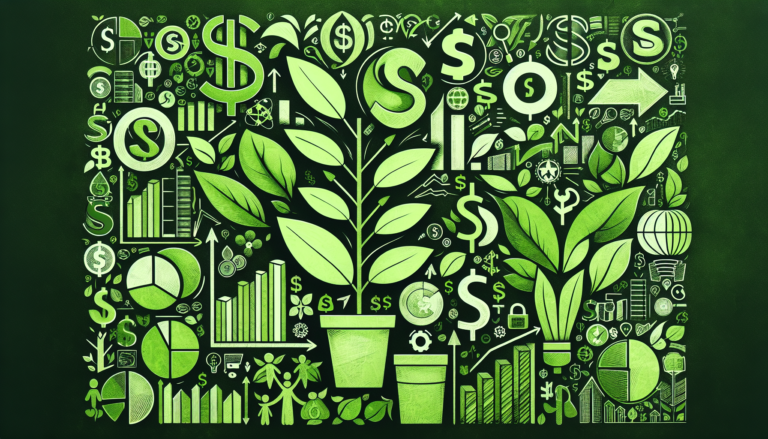Why esg mutual funds are crucial for sustainable investing
ESG mutual funds focus on sustainable and ethical investing by prioritizing companies that meet Environmental, Social, and Governance criteria, allowing investors to align their investments with their values while potentially achieving solid financial returns.
ESG mutual funds are gaining traction as investors seek responsible ways to grow their wealth. By focusing on companies that prioritize environmental, social, and governance criteria, these funds not only align with ethical values but also hold the potential for financial returns. Curious about how to navigate this investment opportunity?
Understanding ESG mutual funds
Understanding ESG mutual funds is essential for investors looking to make an impact with their portfolios. ESG stands for Environmental, Social, and Governance factors that can help assess the sustainability and ethical impact of investments.
What are ESG Mutual Funds?
ESG mutual funds invest in companies that meet certain ESG criteria. This means these funds focus on companies that prioritize eco-friendly practices, social responsibility, and sound governance. They are designed for investors who want to align their financial goals with their values.
Key Components of ESG
The components of ESG can be broken down into three main areas:
- Environmental: This includes factors like climate change policies, carbon footprint, and resource conservation.
- Social: This focuses on how companies manage relationships with employees, suppliers, customers, and communities.
- Governance: This refers to the company’s leadership, executive pay, audits, and shareholder rights.
How ESG Funds Differ from Traditional Funds
Unlike traditional mutual funds, which may focus solely on financial returns, ESG mutual funds incorporate additional criteria for evaluating investments. This approach can lead to more sustainable investment choices and, potentially, long-term financial benefits.
Why Consider ESG Mutual Funds?
Investing in ESG mutual funds allows you to support companies that prioritize socially responsible practices. Additionally, studies have shown that companies with strong ESG practices may outperform their peers in the long run, making them attractive for investors.
Key benefits of ESG investing
Investing in ESG funds offers numerous benefits that go beyond financial returns. These funds align your investments with your values, promoting sustainability and ethical practices in the companies you support.
Positive Impact on Society
ESG investing encourages companies to adopt responsible practices. By choosing these funds, you contribute to social change, whether it’s improving labor conditions or supporting community initiatives.
Better Risk Management
Companies with strong ESG criteria often show better risk management. They are less likely to face scandals, penalties, or regulatory fines, which can lead to more stable investments over time.
Potential for Long-Term Returns
Many studies indicate that companies with solid ESG practices can outperform their competitors in the long run. This potential for growth makes ESG funds attractive for investors looking for sustainable financial solutions.
Responsive to Consumer Preferences
Consumers increasingly favor businesses that prioritize sustainability. Investing in ESG funds allows you to support companies that resonate with modern consumer values, potentially driving their success.
Diverse Portfolio Opportunities
ESG mutual funds provide access to a diverse range of sectors, from renewable energy to sustainable agriculture. This diversification can help mitigate risk across your overall investment portfolio.
How to choose the right ESG mutual fund
Choosing the right ESG mutual fund can be a rewarding but complex process. It requires careful consideration of several key factors to align your investments with your values.
Assess Your Goals
Start by clarifying your investment objectives. Are you focused on long-term growth, income, or both? Knowing what you want to achieve helps narrow down suitable funds.
Understand ESG Ratings
Different funds have varying ESG ratings. Familiarize yourself with the methodologies used to evaluate these ratings. Look for funds that have strong performance in all three ESG categories: Environmental, Social, and Governance.
Review Fund Management
Investigate the fund managers’ track record. Their experience and commitment to ESG principles can greatly influence the fund’s performance. Look for transparency in their investment processes.
Diversity of Holdings
Check the diversity of investments within the fund. A well-diversified fund spreads risk and can provide better long-term returns. Look for exposure across various sectors and regions.
Fees and Expenses
Understand the fees associated with the ESG fund. High fees can eat into your returns over time. Compare expense ratios to find funds that provide good value.
Performance History
Review the fund’s performance over time. While past performance is not a guarantee of future results, it can provide insights into how the fund has responded to market changes.
Performance metrics of ESG funds
Understanding the performance metrics of ESG funds is crucial for making informed investment decisions. These metrics help investors evaluate how well the funds align with both financial goals and sustainable practices.
Return on Investment (ROI)
One of the primary metrics for any fund is the return on investment (ROI). This measures how much profit or loss an investment generates relative to its cost. For ESG funds, it’s important to track ROI over different periods to assess consistency.
Expense Ratios
The expense ratio indicates how much of a fund’s assets are used for expenses, including management fees and operational costs. Lower expense ratios can lead to higher net returns for investors, making them a vital metric to consider when choosing ESG funds.
Volatility
Volatility measures how much the price of a fund fluctuates over time. An understanding of volatility helps investors gauge the risk associated with their investments. Generally, lower volatility may indicate a more stable investment.
Sharpe Ratio
The Sharpe ratio is used to understand the risk-adjusted return of an investment. A higher Sharpe ratio means better returns for the level of risk taken. This metric is valuable for comparing different ESG funds.
ESG Ratings
Many funds receive ESG ratings based on their adherence to sustainability criteria. These ratings can vary among organizations, so it’s essential to consider their source. Funds with higher ESG ratings may indicate a stronger commitment to sustainable practices.
Benchmark Comparisons
Comparing ESG funds to relevant benchmarks can provide insights into their performance relative to the market. Knowing how an ESG fund measures up against traditional indices can help investors make better choices.
Challenges in ESG mutual fund selection
Selecting the right ESG mutual fund comes with its own set of challenges. Understanding these issues can help investors make more informed decisions.
Lack of Standardization
One significant challenge is the lack of standardization in ESG criteria. Different funds might use varying metrics to assess ESG performance, leading to confusion about what truly defines a good ESG investment.
Limited Transparency
Some fund managers may not fully disclose their investment strategies or the underlying companies in their portfolios. This limited transparency makes it difficult for investors to understand how their money is being used and whether it aligns with their values.
Greenwashing Risks
Greenwashing refers to the practice where funds exaggerate or misrepresent their commitment to ESG principles. Investors must be cautious and conduct thorough research to avoid falling for marketing tactics that don’t reflect true sustainability.
Performance Variability
ESG funds can show performance variability in different market conditions. While some may outperform traditional funds, others may lag behind. This inconsistency can create uncertainty for investors looking to achieve specific financial outcomes.
Higher Fees
Many ESG funds come with higher management fees compared to traditional funds. These higher fees can diminish overall returns, making it crucial for investors to weigh the benefits against the costs.
Understanding ESG Ratings
The variety of ESG ratings provided by different agencies can be overwhelming. Investors need to be knowledgeable about how these ratings are calculated and should look for consistency among ratings from multiple sources.
Future trends in sustainable investments
The future trends in sustainable investments are shaping how investors and companies approach finance. As the world becomes more aware of environmental and social issues, these trends are expected to grow.
Increased Demand for ESG Investments
There is a rising demand for ESG investments as individuals and institutions seek to align their portfolios with their values. This trend indicates a shift in investor priorities, favoring sustainability over traditional profit metrics.
Tech Integration in ESG Analysis
Technology is playing a critical role in ESG analysis. Tools like artificial intelligence and big data are enhancing how investors assess sustainability performance, making it easier to analyze vast amounts of data for informed decision-making.
Sustainable Finance Regulation
Governments and regulatory bodies are implementing stricter regulations surrounding sustainable finance. These regulations aim to promote transparency and accountability among companies regarding their ESG practices.
Focus on Impact Investing
Impact investing is gaining traction, as investors increasingly look for measurable outcomes in their investments. This approach prioritizes not only financial returns but also positive societal and environmental impacts.
Emergence of green technologies
The shift towards sustainable investments will likely see the emergence of green technologies. Innovations in energy, waste management, and agriculture can become key focus areas, drawing investment as they contribute to environmental solutions.
Flexible Investment Structures
Investors may see an increase in flexible investment structures that adapt to changing market conditions. This flexibility allows investors to pivot and focus on emerging sustainable opportunities that align with their goals.
In summary, the impact of ESG mutual funds on investing
ESG mutual funds are reshaping how we think about investing. They offer a way to align financial goals with personal values, focusing on sustainability and ethical practices.
As investors become more conscious of environmental and social issues, the demand for these funds will likely grow. By focusing on factors like ESG ratings, performance metrics, and the overall impact on society, investors can make informed decisions.
With advancements in technology and an increase in regulations, the future of sustainable investments looks promising. Embracing these changes can lead to a more sustainable and responsible financial landscape.
In short, considering ESG mutual funds is a vital step toward investing with purpose and making a positive impact.
Frequently Asked Questions
What are ESG mutual funds?
ESG mutual funds are investment funds that focus on companies meeting specific Environmental, Social, and Governance criteria to ensure sustainable and ethical investments.
Why should I invest in ESG mutual funds?
Investing in ESG mutual funds allows you to align your financial goals with your values, supporting companies that prioritize ethical practices and sustainability.
How do I evaluate the performance of an ESG mutual fund?
You can evaluate performance through metrics like return on investment (ROI), expense ratios, and ESG ratings while also considering performance against relevant benchmarks.
What challenges might I face when selecting ESG funds?
Challenges include lack of standardization in ESG criteria, limited transparency from fund managers, and potential greenwashing where funds may exaggerate their sustainability claims.
What trends are shaping the future of sustainable investments?
Trends include increased demand for ESG investments, the integration of technology in ESG analysis, and a growing focus on impact investing that seeks measurable outcomes.
How can I ensure the ESG fund I choose is genuine and effective?
Research funds thoroughly, look for reputable ESG ratings, and ensure transparency from fund managers to verify their commitment to sustainable practices.






